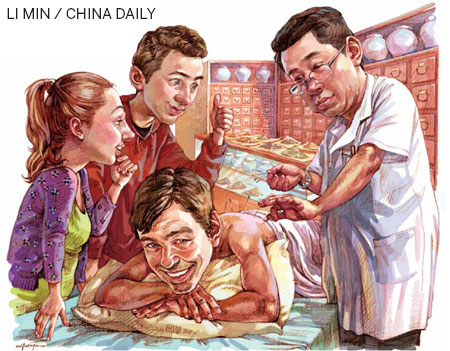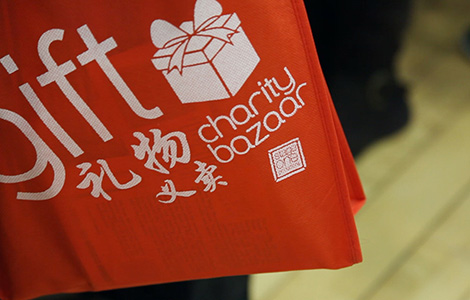Bitter Pill
Updated: 2013-11-22 10:31
By Zhang Chunyan (China Daily Europe)
|
|||||||||||
New quality and safety rules may queer prospects for traditional Chinese medicine practitioners in Europe
In London's Chinatown, a poster in Chinese urges customers to stock up on traditional and other patent Chinese medicines before an impending ban on patented TCM products from next year.
At TCM clinics in London, patients still keep trickling in for acupuncture and massage services. However, there is a lull in demand for various Chinese herbal and patent medications, as customers seem to be wary of the Medicines and Healthcare products Regulatory Agency's forthcoming decision.
Therein lies the twist in the tale. Just as traditional Chinese medicine makes waves in the UK and the rest of Europe with alternative therapies such as acupuncture and massage, it finds itself being denied market access for medications.
Traditional Chinese medicine, which has evolved over 4,000 years, relies largely on patented and herbal medications to prevent and help the human body fight ailments, and treatments to relieve pain and restore balance in the body.
According to the proposal the MHRA floated on July 9, the sale of all unlicensed manufactured herbal medicinal products will be halted in the UK from next year. The MHRA is a British government agency that is responsible for ensuring that medicines and medical devices used in the UK are safe.
The proposal is not targeted specifically at TCM. Andrea Farmer, MHRA's herbal policy manager, says: "The decision was taken on the basis of the Traditional Herbal Medicinal Products Directive, incorporated by the EU in 2004, which stipulates that all the manufactured herbal medicines in the EU market should have a suitable product license."
The directive also introduced the so-called simplified registration procedure with a seven-year transition period for traditional herbal medicinal products to be licensed, including Chinese and Indian traditional medicines.
That period ended in April 2011. After that, the MHRA allowed products that were lawfully in the market before April 2011 to continue being sold, so retail businesses holding huge inventories were not unduly affected.
Though the regulator is yet to finalize its proposals and is still studying the various responses, TCM practitioners hope that a favorable decision will help rejuvenate it in Europe. But the real problem as most experts say is TCM's difficulties in getting licensed in the UK and Europe.
Changing times
A decade ago, China was becoming better known globally and demand for its products was at its peak.
"It was a golden period. TCM was enjoying a surge of popularity in the UK and there were more than 2,000 clinics," says Man Fong Mei, chairman of the Chinese Medical Council UK and president of London-based Mei's Group, which operates a series of herbal clinics and TCM shops across the UK.
Mei, in his 60s, has witnessed first-hand the ups and downs of the TCM industry in the UK.
"TCM practitioners earlier faced rough weather first as there were some concerns that TCM would result in kidney and liver failure. However, those doubts were redressed after the European Union implemented the Traditional Herbal Medicinal Products Directive in 2004," he says.
Since TCM is developed through empirical testing and refinement of herbal mixtures and relies mostly on clinical experience, it is often viewed with mistrust in the West, he says.
Bo-ying Ma, president of the Federation of TCM UK, says the 2008 economic crisis nearly crippled the TCM industry. "Several TCM clinics and herbal chains had to shutter operations due to economic problems.
"Chinese medicine has also not been included in the UK's medical insurance system. As a result, British people whose incomes have fallen are reluctant to buy Chinese medicines."
The latest proposal will act as a knockout blow to the industry, Mei says. "According to my estimates, there are only 1,000 TCM clinics in the UK now. Most of them may find the going even more tough, especially as they try to cope up with the new standards, registration norms and so on."
Typically a TCM business consists of three parts, acupuncture and associated treatments, herbal medicines and industrially manufactured herbal products. If the MHRA proposal is implemented from next year, it will not affect the sales of loose or individual herbs and other self-made products. But TCM practitioners will be in a fix, Mei says, as they can no longer prescribe time-trusted Chinese medications.
Today's Top News
Liaoning begins its 1st long-distance training
Nuclear power 'to fall short of demand'
Caroline Kennedy visits tsunami-struck areas
China to loosen airspace control
China inks regulation to ban official extravagance
9 in police custody after pipeline blasts
Experts doubt smog linked to low birthrate
China, Romania seal railway deals
Hot Topics
Lunar probe , China growth forecasts, Emission rules get tougher, China seen through 'colored lens', International board,
Editor's Picks

|

|

|

|

|

|






